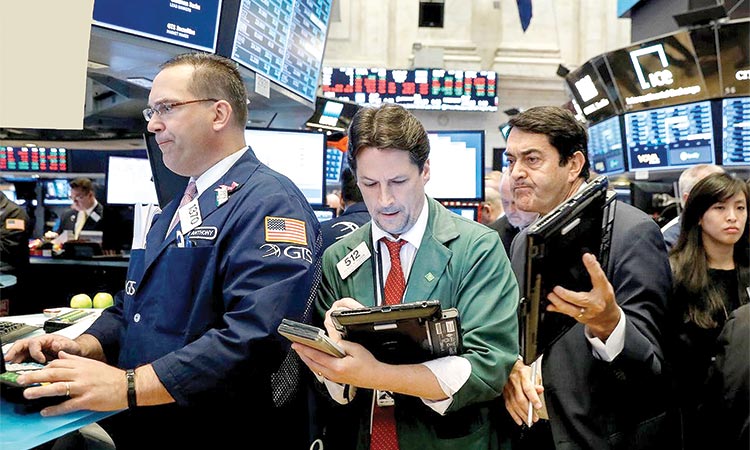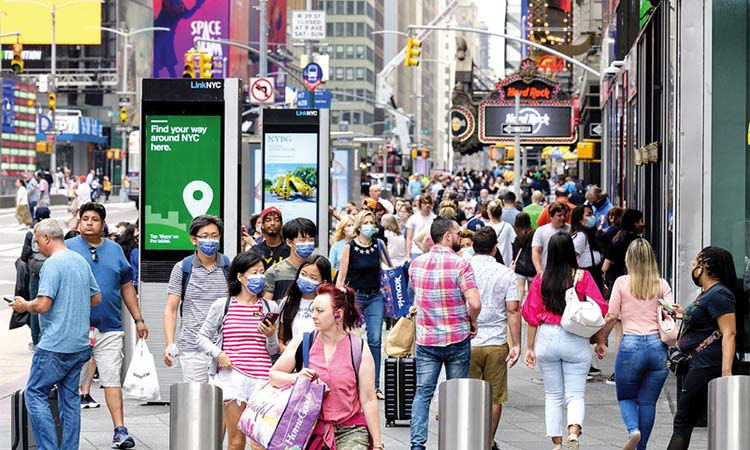
World stocks sank on Monday as the spreading Delta virus variant fuelled fears it could undermine the economic recovery, while oil prices tanked after leading producers finally agreed to hike output.
Oil prices plunged after the Opec+ alliance agreed on Sunday to pump an extra 400,000 barrels per day a month from August to meet rising demand as economies reopen.
London stocks gave up 2.6 per cent in afternoon deals meanwhile after the UK government lifted England’s daily pandemic curbs despite soaring infection rates.
The British pound hit its lowest since February on Monday as global markets turned cautious over a surge in coronavirus infections, meaning that riskier currencies lost out to the safe-haven dollar.
Risk-aversion ruled the day as bond yields dropped and stocks faced their longest losing streak since the pandemic first hit global markets 18 months ago.
The Dow sank more than 2% on Monday as fears a spike in COVID-19 cases would halt a broader economic recovery pummeled economically sensitive and travel stocks and pushed bond yields to five-month lows.

New infections surged in parts of Asia and England, while US COVID-19 cases soared 70% last week, fueled by the Delta variant. All 11 S&P sectors fell in morning trading, with the so-called value stocks including financial, industrial , materials and energy dropping between 2.1% and 4.2%. The banking sub-index sank 2.6%, tracking a fall in the benchmark 10-year Treasury yield to mid-February lows.
The benchmark S&P 500 snapped a three-week winning streak on Friday, with only defensive sectors – perceived to be relatively safe during times of economic uncertainty – posting small gains.
On Monday, the technology-heavy Nasdaq index outperformed the broader market as investors again sought safety in the growth-linked stocks that led Wall Street’s recovery from its coronavrirus-lows last year.
Still, by 10:47am, the Nasdaq was down 1.31%.
By comparison, the Dow Jones Industrial Average was down 2.08% and on track for its worst session since October 2020, while the S&P 500 was down 1.63% and set for its biggest one-day percentage fall since May.
The yield on the benchmark 10-year US Treasury note fell to a five-month low on Monday as the spread of the Delta variant of the coronavirus sparked fears global growth would slow and hamper the reopening of economies. The 10-year yield fell 9.2 basis points to 1.207%, a low last seen in February.
In eurozone trade, Frankfurt slumped by 2.9 per cent and Paris shed 3.0 per cent, and in New York the Dow Jones index was off by 2.1 per cent in morning exchanges.

Europe mirrored sharp losses in Asia as investors dumped risky investments and fretted that runaway inflation could spark interest rate hikes.
“Risk aversion has remained the dominant theme,” noted Fawad Razaqzada, an analyst at ThinkMarkets.
“The sell-off has been quite brutal for stocks, but it is difficult to say whether this is just a retracement ahead of more gains at some later point in time or whether this is the start of something really major,” he added.
In England meanwhile, almost all Covid-19 restrictions were lifted on Monday, a move criticised by many health experts — but hailed by media and supporters as “freedom day”.
“Far from bringing an added dose of confidence to investors, ‘Freedom Day’ appears to be a setback,” Hargreaves Lansdown analyst Susannah Streeter told AFP.
In Asia, Hong Kong was the worst-hit market after the United States warned businesses about the “growing risks” of operating in the city as China tightens its grip, raising concerns about its future as a financial hub.
With vaccines being rolled out around the world and some governments easing lockdowns, equities enjoyed a healthy first half of 2021, with many markets hitting records or multi-year highs as traders bet on a strong rebound from the pandemic.
But the spread of the highly transmissible Delta variant has thrown a spanner in the works as leaders in several countries — particularly those with slow inoculation programmes — reimpose lockdowns and other containment measures.
At the same time, surging inflation has rekindled speculation the Federal Reserve and other central banks could be forced to wind down their ultra-loose monetary policies and raise interest rates sooner than expected.
Oil prices fall: Oil prices plunged more than $4 a barrel on Monday, headed for its worst day since March, after Opec+ agreed to boost output, stoking fears of a surplus as rising COVID-19 infections in many countries threaten demand.
Crude oil’s year-long surge has been sputtering for most of the last two weeks with the prospect of new supply undermining the case for higher prices. With the Delta variant of the coronavirus spreading, funds bailed out of long positions on Monday. Brent crude lost $4.23, or 5.8%, at $69.36 a barrel by 11:08am. US oil futures were down $4.56, or 6.4%, at $67.25 a barrel.












